Exercise Daily – Cancer remains one of the most challenging health issues faced by individuals around the world. The relentless pursuit of effective treatments has led researchers to explore unconventional sources, and in recent years, apple seeds have emerged as a potential ally in the fight against cancer. Although often discarded as waste, apple seeds possess a hidden power that holds promise in assisting cancer patients. We aim to shed light on the powerful benefits of apple seeds, their nutritional value, and how they can positively impact the journey of cancer patients.
In today’s medical landscape, the search for alternative therapies and natural remedies has gained significant momentum. Apple seeds, which are often overlooked, have garnered attention due to their potential anticancer properties. This article dives into the world of apple seeds and uncovers the unique benefits they offer to individuals battling cancer.
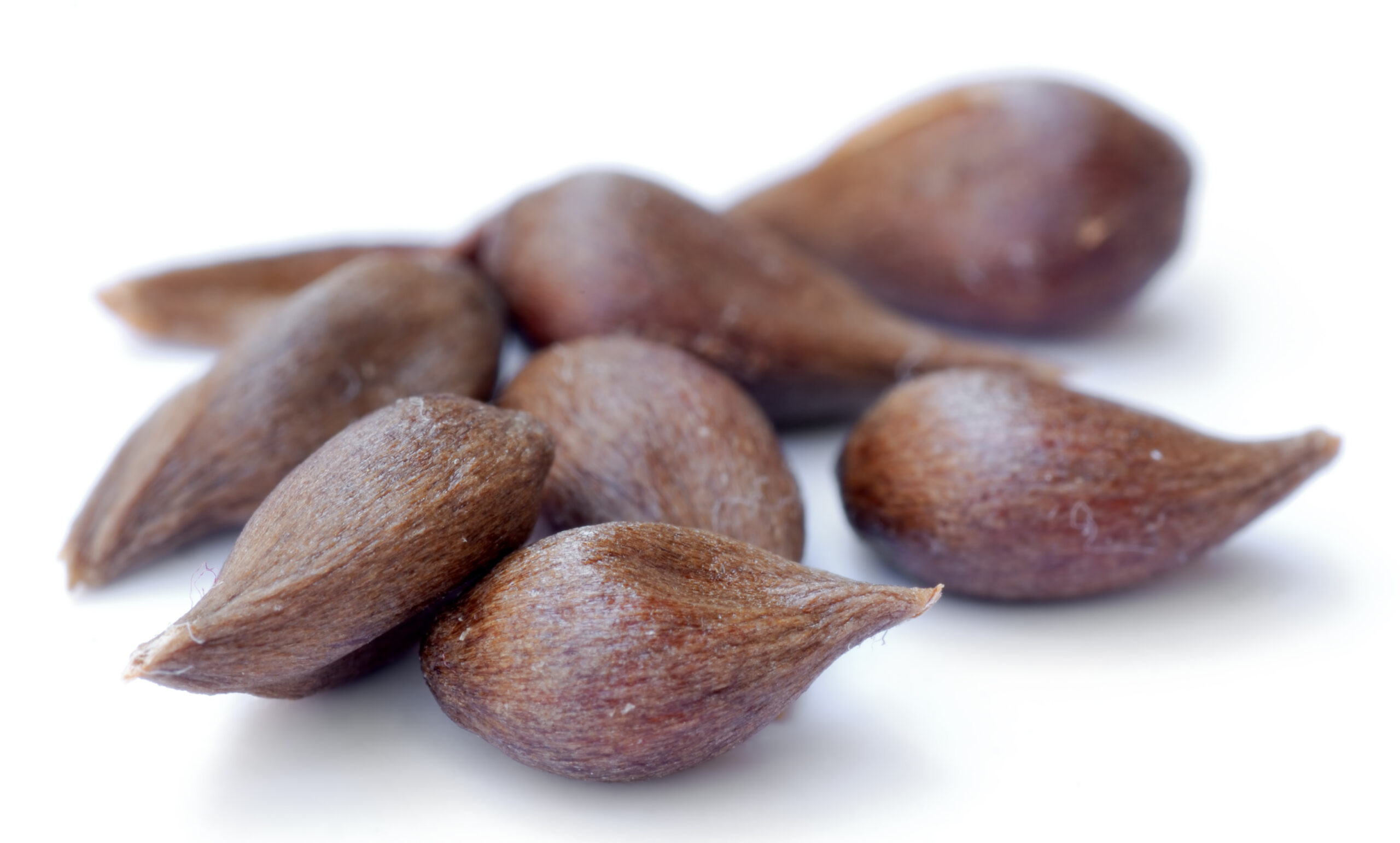
Understanding Cancer
Before delving into the benefits of apple seeds, it’s crucial to have a basic understanding of cancer. Cancer is a complex disease characterized by the uncontrolled growth and division of abnormal cells within the body. It can occur in various forms and affect different organs and systems. Conventional cancer treatments, such as chemotherapy and radiation, can be aggressive and often cause significant side effects. Thus, exploring alternative options is becoming increasingly important.
Apple Seeds: An Unexpected Superfood
Contrary to popular belief, apple seeds are not only edible but also packed with valuable nutrients. They contain essential vitamins, minerals, and healthy fats, making them a potential superfood. While the flesh of the apple receives most of the attention, the seeds possess a nutritional profile that deserves recognition.
Nutritional Profile of Apple Seeds
Apple seeds boast an impressive array of nutrients, including vitamin B17 (amygdalin), vitamin E, essential fatty acids, fiber, and trace minerals like magnesium, zinc, and iron. Vitamin B17, in particular, has been the focus of studies due to its potential anticancer properties. These nutrients work together synergistically to support overall health and provide potential benefits for cancer patients.
Composition of Apple Seeds
1. Macronutrients
Apple seeds are a small but concentrated source of nutrients. They contain essential macronutrients such as carbohydrates, proteins, and fats.
2. Micronutrients
Apple seeds are rich in various micronutrients that contribute to their nutritional profile. They contain minerals like calcium, magnesium, potassium, and phosphorus, which are important for maintaining healthy bodily functions. Additionally, apple seeds provide vitamins such as vitamin E and certain B vitamins, including thiamine and niacin.
3. Fiber Content
Fiber is an essential component of a balanced diet, promoting digestive health and aiding in weight management. Apple seeds contain dietary fiber, which can help regulate bowel movements, reduce cholesterol levels, and provide a feeling of fullness.
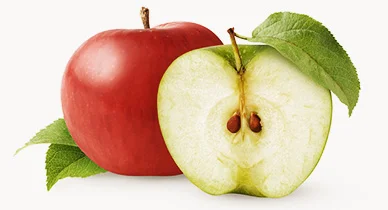
Health Benefits of Apple Seeds
1. Antioxidant Properties
Apple seeds are a good source of antioxidants, including polyphenols, flavonoids, and vitamin E. These compounds help combat oxidative stress in the body, which is associated with various chronic diseases, including heart disease and certain types of cancer.
2. Promotes Digestive Health
The fiber content in apple seeds supports a healthy digestive system. It aids in regular bowel movements, prevents constipation, and promotes the growth of beneficial gut bacteria. Consuming apple seeds as part of a balanced diet can contribute to overall digestive wellness.
3. Supports Cardiovascular Health
The presence of minerals like potassium and magnesium in apple seeds can be beneficial for cardiovascular health. These minerals help regulate blood pressure levels, support proper heart function, and reduce the risk of heart disease.
4. Aids in Weight Management
Due to their fiber content, apple seeds can help with weight management efforts. Fiber promotes satiety, reducing the likelihood of overeating and supporting weight loss or maintenance goals.
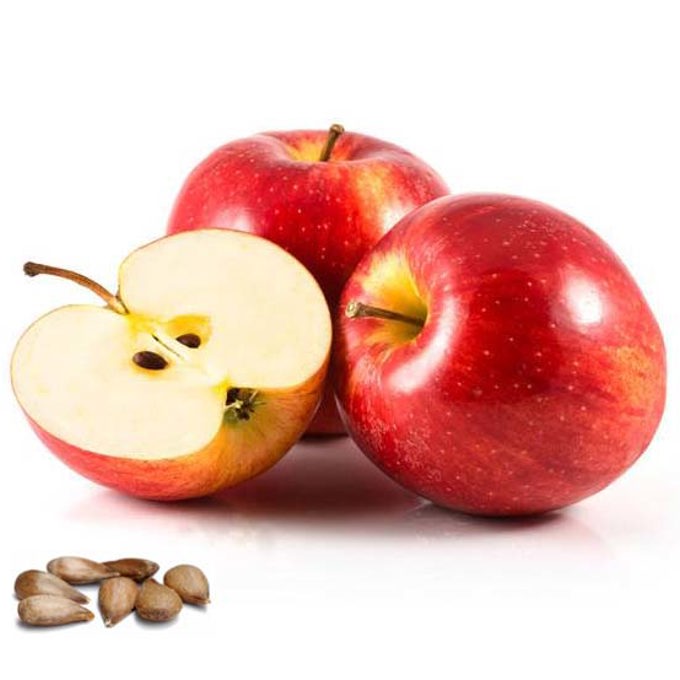
Risks and Precautions
1. Cyanide Content
Apple seeds contain a compound called amygdalin, which can release cyanide when metabolized by the body. However, the cyanide levels in apple seeds are generally not a concern unless consumed in extremely large quantities. Chewing or crushing the seeds releases amygdalin, so it is advisable to avoid eating apple seeds whole.
2. Allergic Reactions
Some individuals may be allergic to apple seeds. Allergic reactions can vary in severity and may include symptoms such as itching, swelling, or difficulty breathing. If you experience any adverse reactions after consuming apple seeds. Experts recommended discontinuing their use and seek medical attention if necessary.
3. Choking Hazard
As apple seeds are small and hard, they pose a choking hazard, particularly for young children. It is essential to keep apple seeds out of reach and dispose of them properly to avoid accidental ingestion.
Ways to Incorporate Apple Seeds in Your Diet
1. Apple Seed Butter
Similar to other nut butter, apple seed butter can be made by grinding apple seeds into a smooth paste. It can be spread on toast, added to smoothies, or used as a dip for fruits and vegetables.
2. Ground Apple Seeds as a Topping
Ground apple seeds can be sprinkled onto salads, yogurt, or oatmeal to add a nutty flavor and boost nutritional content. It’s advisable to use a coffee grinder or food processor to finely grind the seeds before using them as a topping.
3. Apple Seed Tea
Apple seed tea can be prepared by steeping crushed apple seeds in hot water. This infusion can be enjoyed as a warm or iced beverage and may provide a mild apple-like flavor.
Anticancer Properties of Apple Seeds
The unique composition of apple seeds contributes to their potential anticancer properties. Various studies have explored the effects of apple seed extracts on different types of cancer cells, demonstrating their ability to inhibit cancer cell growth and induce apoptosis (programmed cell death). These findings open new avenues for the development of alternative therapies for cancer treatment.
1. Amygdalin
One of the key compounds found in apple seeds is amygdalin, a cyanogenic glycoside. Amygdalin is a nontoxic compound that can be enzymatically broken down in the body to release hydrogen cyanide.
2. Triterpenoids
Apple seeds also contain triterpenoids, which are a class of bioactive compounds. Triterpenoids have been extensively studied for their potential anticancer effects. These compounds exhibit various mechanisms of action that help combat cancer cells.
3. Polyphenols
Polyphenols, a group of antioxidant compounds, are abundantly present in apple seeds. These compounds have been widely recognized for their ability to scavenge harmful free radicals and reduce oxidative stress, which is associated with the development of cancer.
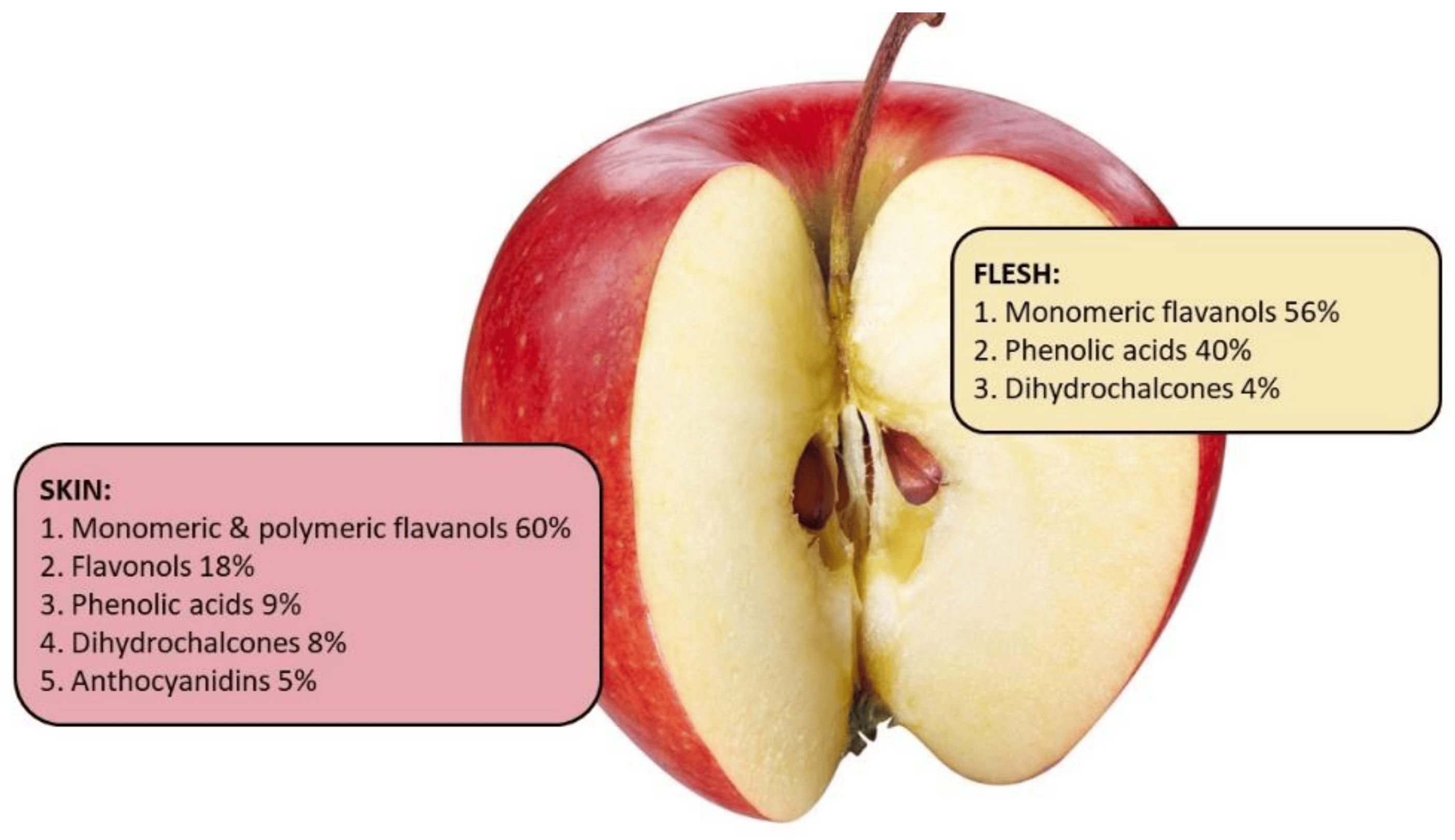
Mechanism of Action
The anticancer properties of apple seeds are attributed to their ability to influence multiple cellular processes. Let’s explore the mechanisms through which these seeds may combat cancer:
1. Inducing Apoptosis
Apoptosis, also known as programmed cell death, is a natural process that eliminates damaged or unwanted cells. Apple seeds induce apoptosis in cancer cells, effectively triggering their self-destruction.
2. Inhibiting Angiogenesis
Angiogenesis is the process of forming new blood vessels, which is crucial for tumor growth and metastasis. Apple seeds contain compounds that can inhibit angiogenesis, thus impeding the blood supply to tumors and limiting their progression.
3. Anti-inflammatory Effects
Chronic inflammation connects to the development of cancer. Apple seeds possess anti-inflammatory properties that help reduce inflammation within the body, potentially reducing the risk of cancer.
Research Studies on Apple Seeds and Cancer
Numerous research studies have been conducted to explore the anticancer potential of apple seeds. While most studies have been conducted in vitro and on animals, some human studies have also shed light on their effects. Let’s delve into the key findings:
1. In vitro Studies
In laboratory settings, apple seed extracts have demonstrated cytotoxic effects against various cancer cell lines. These studies suggest that the compounds present in apple seeds have the ability to selectively target and inhibit the growth of cancer cells.
2. Animal Studies
Animal studies have shown promising results in terms of tumor growth inhibition and increased survival rates when apple seed extracts are administered. These findings provide valuable insights into the potential benefits of apple seeds in vivo.
3. Human Studies
Although human studies on apple seeds and cancer are limited. Some observational studies have reported associations between apple consumption and reduced cancer risk.
Potential Benefits and Limitations
While the anticancer properties of apple seeds are intriguing, it is important to note that they are not a standalone solution for preventing or treating cancer. Apple seeds should be considered as part of a balanced and varied diet, along with other cancer-fighting foods and a healthy lifestyle. It is essential to consult with a healthcare professional before making any significant dietary changes or incorporating apple seeds into your routine.
Safety Considerations
Apple seeds contain amygdalin, which releases hydrogen cyanide under certain conditions. However, the cyanide release from apple seeds during normal digestion is generally considered to be minimal and not harmful. Nevertheless, it is advisable to avoid consuming large quantities of apple seeds or grinding them into a powder, as this may increase the potential for cyanide toxicity.
Tips for Consuming Apple Seeds
If you choose to consume apple seeds, consider the following tips:
- Eat them whole: Eating whole apple seeds, rather than crushing or grinding them, minimizes the risk of excessive cyanide release.
- Moderation is key: Consume apple seeds in moderation as part of a well-balanced diet that includes a variety of other fruits, vegetables, and whole foods.
- Choose organic apples: Opt for organic apples whenever possible to reduce exposure to pesticides and other chemicals.
Apple Seeds and Apoptosis
Apoptosis, also known as programmed cell death, plays a crucial role in the body’s natural defense against cancer. Apple seeds have shown promising effects in promoting apoptosis in cancer cells, potentially limiting their ability to replicate and spread. By encouraging this natural process, apple seeds may aid in slowing down the progression of cancer.
Apple Seeds and Angiogenesis
Angiogenesis, the formation of new blood vessels, is a vital process for tumor growth and metastasis. Researchers have discovered that certain compounds found in apple seeds can inhibit angiogenesis, effectively cutting off the blood supply to cancerous cells. By impeding this process, apple seeds have the potential to hinder the growth and spread of tumors.
Apple Seeds and Metastasis
Metastasis, the spread of cancer cells to other parts of the body, is a significant concern in cancer treatment. Studies have suggested that apple seeds may possess properties that inhibit metastatic processes, reducing the likelihood of cancer cells spreading and invading healthy tissues. This discovery offers hope in combating the aggressive nature of cancer.
Apple Seeds and Immune System
A robust immune system is crucial for cancer patients to fight off the disease and support overall well-being. Apple seeds contain compounds that stimulate the immune system, helping to strengthen its defenses. By enhancing immune function, apple seeds can potentially assist cancer patients in their battle against the disease.
Incorporating Apple Seeds into the Diet
To benefit from the potential advantages of apple seeds, it is essential to know how to incorporate them into the diet safely. Grating apple seeds and adding them to smoothies, salads, or oatmeal can be an easy way to reap their nutritional benefits. However, it is important to exercise caution and moderation due to the presence of amygdalin, which can release cyanide in large amounts.
Precautions and Safety Concerns
While apple seeds show promise in assisting cancer patients, it is crucial to understand the precautions and safety concerns associated with their consumption. The presence of amygdalin in apple seeds raises concerns about cyanide toxicity. It is important to consume them in moderation and avoid consuming large quantities that could be harmful.
Other Health Benefits of Apple Seeds
Beyond their potential benefits for cancer patients, apple seeds offer additional health advantages. They can support cardiovascular health, aid in digestion, promote healthy skin, and contribute to overall well-being. Embracing the power of apple seeds can provide numerous benefits for individuals seeking natural ways to improve their health.
I. Nutritional Value of Apple Seeds
Apple seeds are not just small and inconsequential; they pack a nutritional punch. They are rich in essential nutrients, including vitamins, minerals, and healthy fats. These seeds contain significant amounts of vitamin E, a potent antioxidant that promotes healthy skin and protects against cellular damage. Additionally, apple seeds are a good source of dietary fiber, which aids in digestion and helps maintain a healthy weight.
II. Antioxidant Properties
Apple seeds are known for their high content of antioxidants. Antioxidants play a crucial role in protecting the body against free radicals, harmful molecules that can damage cells and contribute to various health problems. By consuming apple seeds, you can increase your intake of these powerful antioxidants, supporting your overall health and well-being.
III. Potential Anti-Cancer Effects
One of the most intriguing aspects of apple seeds is their potential anti-cancer properties. These seeds contain a compound called amygdalin, which is believed to have anti-tumor effects. While research is ongoing, several studies have suggested that amygdalin in apple seeds may inhibit the growth of cancer cells.
IV. Digestive Health Benefits
Apple seeds can contribute to digestive health in several ways. Firstly, they contain dietary fiber, which adds bulk to the stool and promotes regular bowel movements. By incorporating apple seeds into your diet, you can support a healthy digestive system and prevent issues such as constipation. Additionally, the fiber in apple seeds can help regulate blood sugar levels and promote a feeling of fullness, making it beneficial for weight management.
V. Cardiovascular Health Benefits
Consuming apple seeds may have positive effects on cardiovascular health. Studies suggest that apple seeds can help lower cholesterol levels, particularly LDL cholesterol, which is often referred to as “bad” cholesterol. By including apple seeds in your diet, you may reduce the risk of heart disease and maintain a healthy heart.
VI. Anti-inflammatory Effects
Inflammation is a natural response of the body to injury or infection, but chronic inflammation can lead to various health issues. Apple seeds have shown potential anti-inflammatory effects, which can be beneficial for conditions such as arthritis. By reducing inflammation, apple seeds may help alleviate pain and discomfort associated with inflammatory conditions.
VII. Skin Health Benefits
The antioxidants and vitamins present in apple seeds make them beneficial for skin health. These nutrients help nourish the skin, promote elasticity, and protect against oxidative stress. Incorporating apple seeds into your diet, along with a balanced skincare routine, can contribute to a healthy complexion and a youthful appearance.
VIII. Weight Management Benefits
If you’re aiming to shed some pounds or maintain a healthy weight, apple seeds can be a valuable addition to your diet. The high fiber content in these seeds aids in weight loss by promoting feelings of fullness and reducing overall calorie intake. By including apple seeds in your meals or snacks, you can support your weight management efforts and feel satisfied for longer periods.
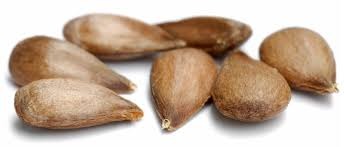
Home Remedies for Colon Cancer
While home remedies cannot cure colon cancer, they can play a supportive role in managing symptoms and improving overall well-being. It’s important to note that these remedies should always use in consultation with healthcare professionals.
Dietary Changes
A healthy diet is crucial for individuals with colon cancer. Incorporating fiber-rich foods, such as fruits, vegetables, whole grains, and legumes, can help regulate bowel movements and promote digestive health. It’s also essential to reduce the intake of processed foods, red meat, and alcohol.
Herbal Supplements
Certain herbal supplements may offer potential benefits for colon cancer patients. However, it’s vital to consult with a healthcare professional before using any supplements, as they can interact with medications or have side effects. Some commonly studied herbs include turmeric, ginger, green tea, and garlic.
Lifestyle Modifications
Adopting a healthy lifestyle can contribute to overall well-being and support colon cancer treatment. Regular exercise, stress management techniques, and quitting smoking are all beneficial for individuals with colon cancer. These lifestyle changes can enhance the effectiveness of medical treatments and improve quality of life.

Home Remedies for Bone Cancer
While home remedies cannot cure bone cancer, they may provide relief from symptoms and support overall well-being. Here are some home remedies:
1. Turmeric
Turmeric is known for its anti-inflammatory properties and contains a compound called curcumin, which has potential anti-cancer effects. Adding turmeric to your diet or taking curcumin supplements may help reduce inflammation and support overall health.
2. Ginger
Ginger has been used for centuries for its medicinal properties. It possesses anti-inflammatory and antioxidant effects that may help manage pain and nausea associated with bone cancer. Consuming ginger tea or adding fresh ginger to meals can be beneficial.
3. Green Tea
Green tea is rich in antioxidants, which can help protect cells from damage. It also contains compounds that have been studied for their potential anticancer properties. Drinking green tea regularly may offer some health benefits for individuals with bone cancer.
4. Garlic
Garlic is known for its immune-boosting properties and contains compounds that have been studied for their potential anticancer effects. Incorporating garlic into your meals can be a flavorful way to support overall health during cancer treatment.
5. Maitake Mushrooms
Maitake mushrooms have long been used in traditional medicine and are believed to have immune-enhancing properties. These mushrooms contain a compound called beta-glucan, which has shown promise in supporting the immune system. Adding maitake mushrooms to your diet may be beneficial.
6. Cat’s Claw
Cat’s claw is an herb that has been used traditionally for its anti-inflammatory properties. It may help reduce pain and inflammation associated with bone cancer. Cat’s claw supplements are available, but it is important to consult with a healthcare professional before use.
7. Vitamin C
Vitamin C is an essential nutrient that plays a crucial role in immune function. It is found in various fruits and vegetables, such as oranges, strawberries, and bell peppers. Incorporating vitamin C-rich foods into your diet can help support overall health.
8. Exercise
Regular exercise, under the guidance of a healthcare professional, can have numerous benefits for individuals with bone cancer. It can help improve strength, flexibility, and overall well-being. Engaging in low-impact activities like walking, yoga, or swimming can be beneficial.
9. Mind-Body Techniques
Mind-body techniques, such as meditation, deep breathing exercises, and guided imagery, can help reduce stress and improve emotional well-being. These techniques can incorporate into daily routines to promote relaxation and enhance the mind-body connection.
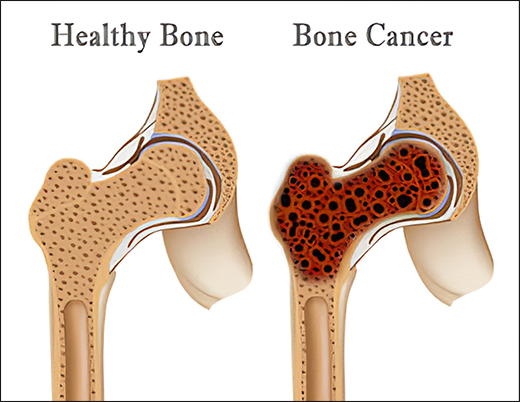
Home Remedies for Lung Cancer
1. Dietary Changes
A healthy diet can make a significant difference in managing lung cancer. Focus on consuming nutrient-rich foods, such as fruits, vegetables, whole grains, and lean proteins. These foods provide essential vitamins, minerals, and antioxidants that support the body’s natural defense mechanisms.
2. Herbal Remedies
Several herbs have been studied for their potential anticancer properties. Some commonly used herbal remedies for lung cancer include:
- Turmeric: Contains curcumin, which has demonstrated anti-inflammatory and anticancer effects.
- Ginseng: Known for its immune-boosting properties and potential to reduce chemotherapy-related side effects.
- Green tea: Rich in antioxidants called catechins, which may help inhibit the growth of cancer cells.
It’s important to consult with a healthcare professional before incorporating herbal remedies, as they can interact with certain medications.
3. Breathing Exercises
Deep breathing exercises can be beneficial for lung cancer patients. They can help improve lung capacity, reduce anxiety, and promote relaxation. Practices like diaphragmatic breathing, pursed-lip breathing, and belly breathing can be learned and practiced under the guidance of a qualified instructor.
4. Mind-Body Practices
Mind-body practices like meditation, yoga, and tai chi can help individuals cope with the emotional and physical challenges of lung cancer. These practices promote relaxation, reduce stress, and improve overall well-being.
5. Stress Reduction Techniques
Managing stress is crucial for lung cancer patients, as stress can negatively impact the immune system and overall health. Techniques such as mindfulness, journaling, engaging in hobbies, and seeking support from friends and family can significantly reduce stress levels.
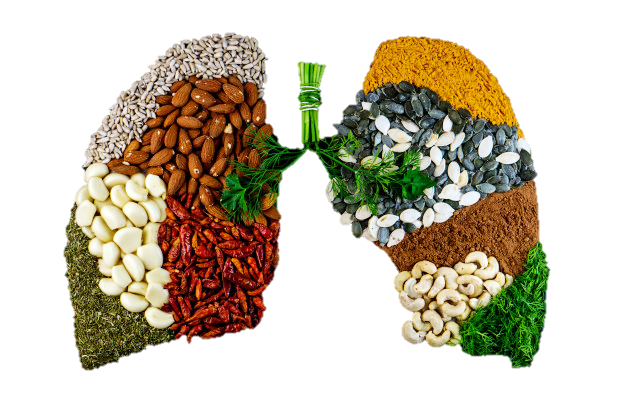
Benefits of Apple Seeds for Athletes’ Performance
1. Antioxidant Properties
Apple seeds are known for their antioxidant properties. Antioxidants help combat oxidative stress caused by intense physical activity, which can lead to muscle damage and fatigue. The antioxidants found in apple seeds, such as flavonoids and polyphenols, protect the body against harmful free radicals, reducing the risk of oxidative damage and promoting faster recovery.

2. Enhanced Digestion
The fiber content in apple seeds promotes healthy digestion. Athletes often require efficient digestion to absorb nutrients effectively and maintain energy levels. By consuming apple seeds, athletes can improve their digestive health, prevent gastrointestinal issues, and ensure proper nutrient absorption.
3. Boosted Energy Levels
Apple seeds contain natural sugars, including fructose, glucose, and sucrose, which provide a quick and sustainable energy boost. This natural source of energy can be particularly beneficial for athletes, as it provides a readily available fuel source during training sessions or competitions. Adding apple seeds to pre-workout snacks or meals can help athletes sustain their energy levels and enhance their performance.
4. Improved Muscle Recovery
Athletes engage in rigorous training sessions that can lead to muscle soreness and damage. Apple seeds contain amino acids, including methionine and tryptophan, which play a vital role in muscle repair and recovery. By consuming apple seeds, athletes can support the healing process of damaged muscles and reduce post-exercise soreness.
5. Strengthened Immune System
A robust immune system is essential for athletes to stay healthy and avoid illnesses that may hinder their performance. Apple seeds contain antioxidants and vitamins that help strengthen the immune system. The vitamin C and other immune-boosting compounds in apple seeds can assist athletes in maintaining their overall well-being and reducing the risk of infections.
6. Reduced Inflammation
Intense physical activity can lead to inflammation in the body, causing discomfort and hindering performance. Apple seeds contain anti-inflammatory compounds, such as polyphenols and flavonoids, which help reduce inflammation and promote faster recovery. By including apple seeds in their diet, athletes can minimize inflammation and enhance their training and recovery process.
7. Supporting Bone Health
Athletes put significant stress on their bones during training and competition. Apple seeds contain essential minerals like magnesium, phosphorus, and calcium, which are crucial for maintaining strong and healthy bones. Regular consumption of apple seeds can support bone density, reduce the risk of fractures, and ensure the overall skeletal health of athletes.
8. Regulated Blood Pressure
High blood pressure can have detrimental effects on an athlete’s performance and overall health. The potassium content in apple seeds plays a vital role in regulating blood pressure levels. By incorporating apple seeds into their diet, athletes can support healthy blood pressure, optimize cardiovascular function, and improve their endurance.
Conclusion
In conclusion, apple seeds possess untapped potential in the realm of cancer treatment and overall health. Their nutritional composition and unique properties make them a hidden gem in supporting cancer patients on their journey. While more research is needed to fully understand their benefits and mechanisms of action. It’s incorporating apple seeds into a balanced diet, under professional guidance, may offer a complementary approach to cancer treatment and overall well-being.
FAQs – Benefits of Apple Seeds for Cancer Patients
Q1: Can apple seeds alone cure cancer?
No, apple seeds should not be considered a standalone cure for cancer. They can be a valuable addition to a comprehensive cancer treatment plan. But it can use in consultation with healthcare professionals.
Q2: How many apple seeds can be safely consumed in a day?
Experts recommend it to consume apple seeds in moderation. A few seeds per day can provide potential benefits without raising concerns about cyanide toxicity. However, it is best to consult with a healthcare professional for personalized advice.
Q3: Can apple seeds replace conventional cancer treatments?
No, apple seeds should not be used as a substitute for conventional cancer treatments. They can be complementary to conventional therapies and may assist in supporting overall health during the cancer treatment journey.
Q4: Are there any specific apple varieties that offer more benefits?
While various apple varieties share similar nutritional profiles, some studies suggest that certain apple varieties, such as bitter apple seeds, may have higher levels of beneficial compounds.
Q5: Are there any individuals who should avoid consuming apple seeds?
Individuals with known allergies to apples or who have been advised to avoid apple consumption due to specific health conditions should also avoid consuming apple seeds. It is always best to consult with a healthcare professional before making any dietary changes.



